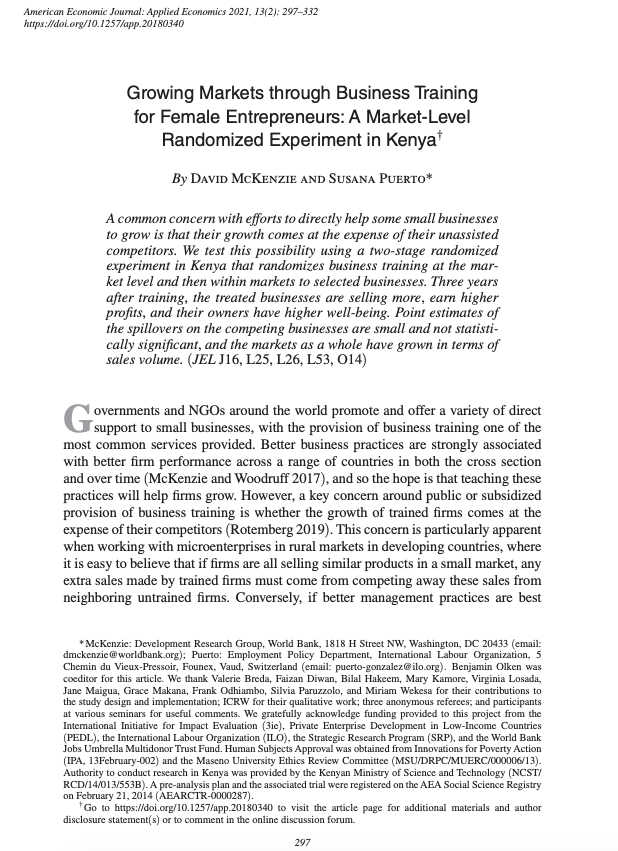Reproducibility package for Growing Markets through Business Training for Female Entrepreneurs: A Market-Level Randomized Experiment in Kenya
Overview
A common concern with efforts to directly help some small businesses to grow is that their growth comes at the expense of their unassisted competitors. We test this possibility using a two-stage randomized experiment in Kenya that randomizes business training at the market level and then within markets to selected businesses. Three years after training, the treated businesses are selling more, earn higher profits, and their owners have higher well-being. Point estimates of the spillovers on the competing businesses are small and not statistically significant, and the markets as a whole have grown in terms of sales volume.
Reproducibility Package
| Name | URL |
|---|---|
| Creative Commons Attribution 4.0 International (CC BY 4.0) License | https://creativecommons.org/licenses/by/4.0/ |
| Repository name | URI |
|---|---|
| AEA Data and Code Repository | https://www.openicpsr.org/openicpsr/aea |
Reproducibility
A readme file details the reproduction instruction. A folder StataAddons contains all ado files used.
Data
All data is public and contained in the (external) reproducibility package.
Description
| Author | Affiliation | |
|---|---|---|
| David McKenzie | World Bank | dmckenzie@worldbank.org |
| Susana Puerto | Employment Policy Department, International Labour Organization | puerto-gonzalez@ilo.org |
We thank Valerie Breda, Faizan Diwan, Bilal Hakeem, Mary Kamore, Virginia Losada, Jane Maigua, Grace Makana, Frank Odhiambo, Silvia Paruzzolo, and Miriam Wekesa for their contributions to the study design and implementation; ICRW for their qualitative work; three anonymous referees; and participants at various seminars for useful comments.
2021-04
Scope and coverage
| Location | Code |
|---|---|
| Kenya | KEN |
Disclaimer
The materials in the reproducibility packages are distributed as they were prepared by the staff of the International Bank for Reconstruction and Development/the World Bank. The findings, interpretations, and conclusions expressed in this event do not necessarily reflect the views of the World Bank, the Executive Directors of the World Bank, or the governments they represent. The World Bank does not guarantee the accuracy of the materials included in the reproducibility package.
Information on metadata
| Name | Abbreviation | Affiliation |
|---|---|---|
| Krestel | CK | World Bank |
2023-06-13
1
